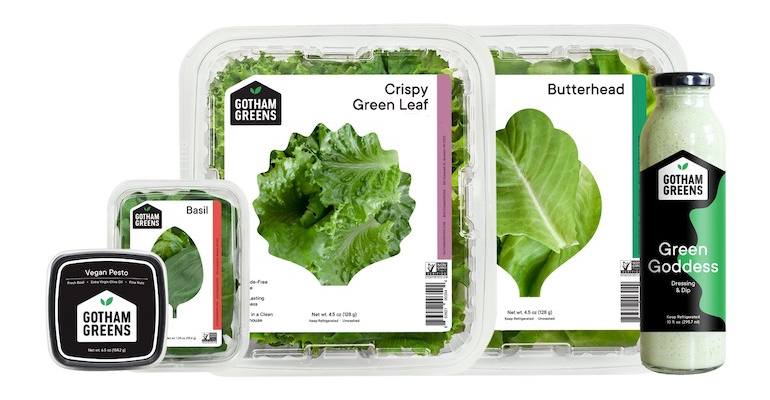News
Gotham Greens expands its local greenhouses with $87M in funding
7 Jan 2021Indoor greenhouse company Gotham Greens raised $87 million in a Series D round led by Manna Tree, bringing its total funding to $130 million while also doubling its revenue in the past year. Retail volume growth has jumped 80% year over year for the company’s lettuces, herbs, pestos and salad dressings.
In addition to more sales, the New York greens company has expanded its geographical footprint. In the past 12 months, the company opened greenhouses in Chicago, Providence, R.I., Baltimore and Denver, and it is now selling its products in over 2,000 retail locations across 40 states. With its new funding, the company plans to further accelerate its output in an effort to decentralize food production and expand access to its products across the United States.

As consumers move toward more locally-grown, healthier food, indoor greenhouses have received an explosion in funding. This year alone, Revol Greens raised $68 million, BrightFarms raised $100 million and AppHarvest announced plans to go public. From October to December, investors dumped $1 billion into the hyped indoor greenhouse industry, according to Forbes.
Within the space, Gotham Greens represents only 1% of sales with an annual output of 35 million heads of lettuce per year. But lettuce is a popular and valuable crop. In 2017, the leafy green had a farm gate value of over $2.5 billion in the United States, according to the United States Department of Agriculture. It is also a crop that has been plagued with foodborne illness and criticism over the environmental impact of its water usage in recent years.
Indoor greenhouses address these issues as they use significantly less water than traditional field agriculture and they are also self-contained environments that allow for increased control of inputs and outputs that can contain potentially harmful bacteria. Furthermore, the locally stationed greenhouses have increased in appeal as the pandemic has caused instability and uncertainty in supply chains worldwide. These circumstances have created the perfect storm for the expansion of these greens growing businesses.
"The pandemic has revealed flaws in America's food supply chain system, particularly in the produce category, and new leaders and innovators need to emerge to ensure a stable food supply for the future,” said Brent Drever, Co-Founder and President of Manna Tree in a statement.
Even when the pandemic subsides, locally-produced agriculture that is less impactful on the environment is likely to retain its popularity. The World Economic Forum predicts that the world will require a 50% to 100% increase in food production by 2050 to feed people. Accomplishing this will require a shift in the food ecosystem, which may be led by these greenhouses that promote accessibility and functionality alongside sustainability.
Related news

Oat Barista: Innovation for game-changing beverages
20 Nov 2025
Oat Barista is a clean label, sustainable, and innovative drink base specifically designed to create the perfect foam in one single ingredient.
Read more
Nitrites: Pressure grows on UK to follow EU’s lead
20 Nov 2025
Pressure is growing on the UK to follow the EU’s lead after the bloc revised its regulations on the permitted levels of nitrites and nitrates in cured meats.
Read more
Empowering innovation in fortification and colouration
13 Nov 2025
Divi’s Nutraceuticals offers a large portfolio of innovative, high-quality ingredients for foods, beverages, and supplements, with bespoke solutions and expert support for product success.
Read more
Danone highlights digestive health as potential ‘tipping point’ for food industry
13 Nov 2025
Danone is betting on a food industry “tipping point” that will bloat the market for healthy products, particularly those related to gut health.
Read more
Standing Ovation and Bel scale up casein production from dairy co-products
11 Nov 2025
Foodtech company Standing Ovation has partnered with cheese specialist Bel Group to manufacture dairy serums for industrial-scale casein production via precision fermentation.
Read more
AI attraction means foodtech startups must ‘prove’ rather than ‘promise’
4 Nov 2025
Reports suggest that artificial intelligence (AI) is sucking investment from foodtech and agritech, but investors say the picture is complicated.
Read more
Will postbiotics become the go-to functional ingredient?
3 Nov 2025
Postbiotics show significant promise for the functional foods market due to their safety profile and beneficial bioactive properties, research suggests.
Read more
Meet the finalists of the Fi Europe Innovation Awards 2025
31 Oct 2025
Who made it to the shortlist of the Fi Europe Innovation Awards 2025? Read about the 23 companies making food and drink products healthier and manufacturing processes more efficient.
Read more
Penguin and Club bars no longer classed as chocolate
30 Oct 2025
Penguin and Club bars can no longer be classified as chocolate after the pladis-owned McVitie’s brands turned to cheaper alternatives amid the ongoing cocoa crisis.
Read more
Shorter drying time, sweeter success!
30 Oct 2025
Curious about cost-effective, sustainable and delicious candy making? Stefan Wessel reveals how Avebe’s solutions reduce drying time and energy use by up to 50%.
Read more